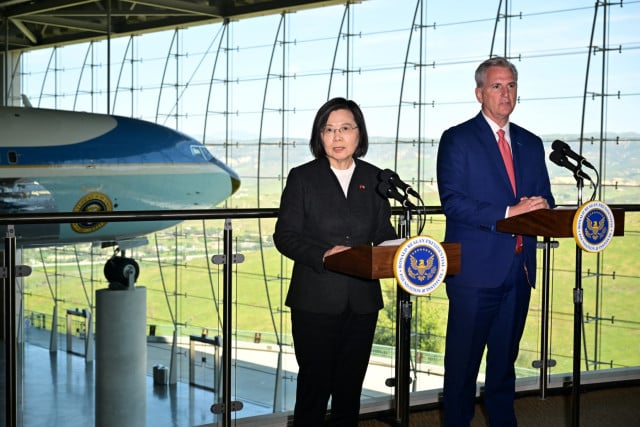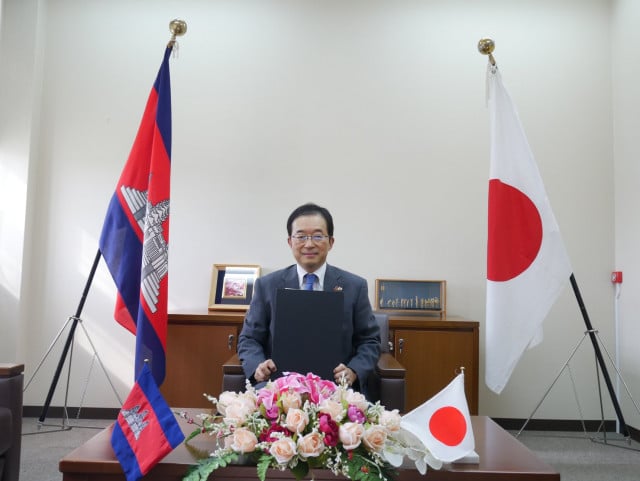Taiwan 'grateful' after US House speaker meeting, China lashes out

- By Agence France-Presse (AFP)
- April 6, 2023 8:47 AM
Simi Valley, United States -- Taiwan's president expressed gratitude for a meeting with US House Speaker Kevin McCarthy on Wednesday, saying it showed her island was "not isolated" on the international stage -- but Beijing soon after threatened a "resolute" response.
Tsai Ing-wen, who was greeted by the top Republican in California, said she had received a warm welcome in the United States from politicians on both sides of the aisle.
"Their presence and unwavering support reassure the people of Taiwan that we are not isolated and we are not alone," she told reporters at the Ronald Reagan Presidential Library in Simi Valley.
Tsai's visit to California is technically a stop-over after a trip to Latin America to see two of Taiwan's dwindling band of official diplomatic allies.
Despite its having been ruled separately for more than 70 years, China views Taiwan as part of its territory and has vowed to one day seize it, by force if necessary.
Beijing balks at any official contact Taipei has with other countries, insisting there is only "one China," and hours after Tsai and McCarthy appeared in front of the cameras, it shot back.
"In response to the seriously erroneous acts of collusion between the United States and Taiwan, China will take resolute and effective measures to safeguard national sovereignty and territorial integrity," the foreign ministry said.
- 'Profound importance' -
McCarthy, who is second in line to the US presidency, said a shared belief in freedom and democracy underpinned a relationship that was "a matter of profound importance to the free world."
He vowed US arms sales to Taiwan -- which infuriate Chinese leadership -- would continue, in what he said was a proven strategy to dissuade aggression.
"And what we know through history, the best way to do that is supply the weapons that allow people to deter war," he told reporters at the library, north of Los Angeles.
"It is a critical lesson that we learned through Ukraine, that the idea of just sanctions in the future is not going to stop somebody" who wants to wage war.
Despite having all the trappings of a fully functioning state, only a handful of countries acknowledge Taiwan as a sovereign nation.
Under a carefully constructed diplomatic fudge, the United States formally recognizes authoritarian Beijing, but is an important backer of Taiwan, and maintains strong unofficial and commercial ties.
Taipei enjoys bipartisan support in the US Congress, and has grown closer to Washington under Tsai's leadership -- much to China's annoyance.
Support for Taiwan -- and disapproval of China -- is one of the few issues that unites America's warring politicians.
- 'Beacon of freedom' -
Last year, McCarthy's predecessor, Democrat Nancy Pelosi sparked fury in Beijing by becoming the most senior US politician to visit the island in over two decades.
That prompted Beijing to launch its largest-ever military exercises in waters around Taiwan.
McCarthy had originally planned to go himself, but opted instead to meet Tsai in California.
The decision was viewed as a compromise that would underscore support for Taiwan but avoid inflaming tensions with China.
Pelosi on Wednesday praised the California meeting, which was attended by more than a dozen lawmakers, both Democrat and Republican.
"Today's meeting between President Tsai of Taiwan and Speaker McCarthy is to be commended for its leadership, its bipartisan participation and its distinguished and historic venue," she said.
Tsai's stop in southern California comes after trips to Guatemala and Belize and after a brief stop in New York last week, where she was greeted by flag-waving Taiwanese expatriates.
Tsai times out as Taiwanese president in 2024, and her party is facing a challenge from opponents seen as closer to Beijing.
She has positioned herself as a defender of the status quo -- de facto, but unspoken, independence, even as China ramps up the pressure, poaching allies and pressuring foreign governments to isolate Taipei.
"It is no secret that today, the peace that we have maintained, and the democracy which have worked hard to build are facing unprecedented challenges," she told reporters.
"We once again find ourselves in a world where democracy is under threat and the urgency of keeping the beacon of freedom shining cannot be understated.
"Taiwan is grateful to have the United States of America by all sides as we confront the unique challenges of our time."
© Agence France-Presse















